Do you have a question about the ALIBI ALI-NVR5032P and is the answer not in the manual?
Information regarding FCC compliance and conditions for device operation.
Guidelines for safe and proper operation and installation of the NVR.
Essential safety guidelines for installation and future reference.
Details the functions and uses of NVR components and indicators.
Explains the function of the remote control and its buttons.
Describes how to use a standard USB mouse for NVR operation.
Explains the on-screen keyboards for data entry and their functions.
Lists system components and items needed for installation.
Provides general recommendations for NVR installation and placement.
Instructions for installing a hard disk drive (HDD) into the NVR.
Guidance on selecting a suitable location for the NVR unit.
Instructions for wiring alarm inputs and outputs to the NVR.
Details how to connect external alarm sensors to the NVR's input terminals.
Explains how to connect external devices to the NVR's alarm output terminals.
Steps for connecting essential peripherals like monitors and mice.
Procedures for connecting all system components for initial setup.
Guides through the initial setup wizard for essential NVR configuration.
How to navigate and access the NVR's main menu interface.
Options for configuring individual camera settings and features.
How to configure On-Screen Display (OSD) settings for cameras.
Adjusting image parameters like brightness, contrast, and hue for cameras.
Configuring settings for Pan, Tilt, and Zoom (PTZ) capable cameras.
Setting up motion detection parameters and actions for cameras.
Configuring privacy zones to block specific areas in camera video feeds.
Setting up video tampering detection and response actions.
Configuring detection and alerts for video signal loss from cameras.
Information on Video Content Analysis (VCA) setup, if supported.
Procedures for manually adding IP cameras to the NVR system.
Setting up custom protocols for specific camera compatibility.
Managing and configuring the NVR's Hard Disk Drive (HDD) settings.
How to check the operational status of installed Hard Disk Drives.
Adding and configuring network storage devices like NAS or IP SAN.
Setting up HDD modes like Partition or Group for recording.
Performing S.M.A.R.T. data display and Bad Sector Detection for HDDs.
Procedures for correctly starting, stopping, and restarting the NVR.
Steps to properly power on the NVR system.
Steps to properly power off the NVR system.
Instructions on how to restart or reboot the NVR.
Describes how to view live camera feeds and available operations.
Using the NVR's front panel buttons for live view control.
Mouse operations for navigating and controlling the live view interface.
Features available when using an auxiliary monitor for live view.
Explains the meaning of icons displayed in the live view screen.
Accessing frequently used functions via the quick setting toolbar.
Navigating the pop-up menu accessed by right-clicking on the desktop.
Customizing live view display options like screen split and dwell time.
Configuring settings to reduce bandwidth for remote viewing.
Setting up parameters for controlling PTZ-capable cameras.
Configuring camera positions (presets), movement paths (patrols), and sequences (patterns).
Steps to save specific camera positions as presets.
Instructions on how to quickly move the camera to a saved preset position.
Setting up automated camera movements between key points (presets).
Activating pre-defined camera patrol sequences.
Recording and saving custom camera movement sequences.
Executing recorded custom camera movement patterns.
Accessing the dedicated panel for PTZ camera control.
Setting up recording parameters such as stream type, resolution, and pre/post-record.
Configuring encoding parameters for individual camera streams.
Setting up schedules for automatic recording start and stop times.
Configuring schedules for capturing still images at set intervals.
Setting up recording triggered by motion events in defined camera areas.
Initiating and stopping manual recording sessions.
Grouping HDDs and assigning them to specific recording tasks.
Locking recorded files to prevent overwriting or setting HDD property.
Accessing and reviewing recorded video footage.
Quickly playing back the last five minutes of recorded video for a channel.
Playing back recorded video for a specific channel using the calendar.
Playing back recorded video based on a specific date and time.
Searching and playing back video based on event types like motion or alarms.
Finding and replaying video clips using user-defined tags.
Efficiently reviewing video by playing motion/VCA events at higher speeds.
Playing back video clips associated with entries found in system logs.
Playing video files from external USB storage devices.
Reviewing video footage frame by frame for detailed analysis.
Playing back recorded footage in reverse for multiple channels simultaneously.
Zooming into specific areas of the video feed during playback.
Procedures for exporting recorded video clips to external storage.
Easily exporting video clips from selected camera channels.
Exporting video clips based on specific time spans found via video search.
Exporting video clips related to detected events like motion or alarms.
Exporting specific segments of video clips directly from playback.
Steps for creating new user accounts with specific permissions.
Procedure for removing existing user accounts from the system.
Modifying existing user account details and permissions.
Instructions for changing the admin user's password for security.
Setting up fundamental network parameters like IP address and gateway.
Configuring advanced network features and protocols.
Setting up Dynamic DNS for remote network access.
Configuring an NTP server for accurate system date and time synchronization.
Setting up a remote host to receive alarm events and messages.
Configuring multicast settings for efficient video streaming.
Configuring Real Time Streaming Protocol for media servers.
Changing default server and HTTP port numbers for network access.
Setting up email notifications for alarms and system events.
Enabling Universal Plug and Play for network device discovery.
Viewing system status, device information, and configuration details.
Accessing and exporting system logs containing event and operation records.
Searching system logs for specific entries based on criteria.
Exporting and importing NVR configuration files for backup or transfer.
Updating the NVR's system firmware to the latest version.
Resetting the NVR to its factory default configuration.
Tools for diagnosing and monitoring network performance.
Viewing real-time network traffic data and status.
Performing network tests for delay and packet loss.
Capturing and exporting network data packets to a USB device.
Verifying the current network status and connectivity.
Monitoring network statistics like bandwidth and connection status.
Performing S.M.A.R.T. and Bad Sector Detection tests on HDDs.
Configuring an N+1 hot spare backup system for enhanced reliability.
Setting up a device to act as a hot spare for the NVR.
Configuring the primary device to be backed up by the hot spare.
Linking working devices to the hot spare system.
Cloning HDD data to an eSATA disk for backup or migration.
Accessing the NVR remotely via a web browser and login credentials.
Viewing live camera feeds remotely through the web interface.
Remotely reviewing recorded video footage from the NVR.
Remotely accessing and viewing system logs.
Remotely viewing and modifying NVR configuration settings.
Information on recommended HDD types for optimal system performance.
Step-by-step instructions for physically installing HDDs into the NVR.


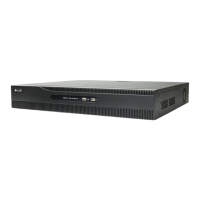
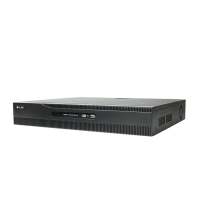



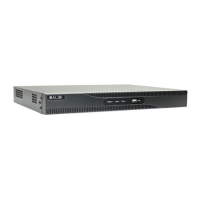
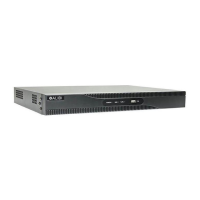
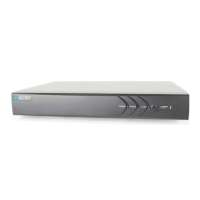
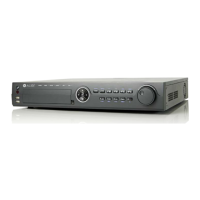

